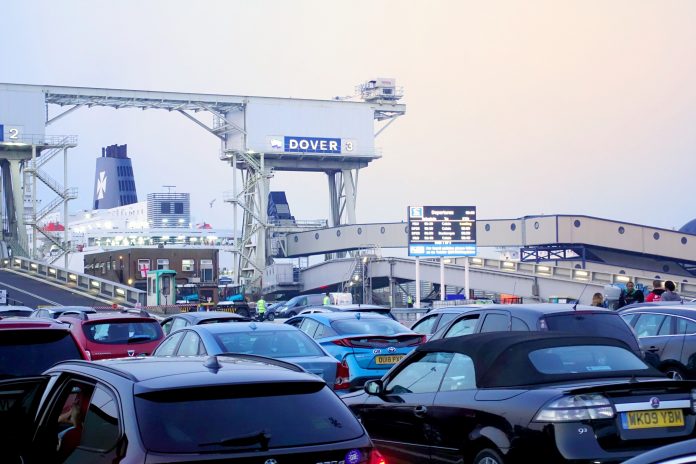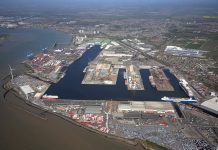There have been significant delays at Dover in recent days, leading to concerns that congestion may continue at the UK border long-term
The problems have been significant, with traffic at a standstill, with many waiting more than five hours in their cars and lorries.
While there seems to have been improvement at Dover, there are still concerns regarding the free flow of traffic. There seems to be two sides emerging in the ensuing debate over who is to blame, with the Immigration Services Union general Secretary Lucy Moreton saying that Brexit is to blame and others suggesting French mismanagement at the border.
The Brexit effect on border mismanagement and control
There were a lot of political promises and rhetoric delivered during the Brexit referendum campaign. A few of these statements have been regularly re-posted on social media and referenced within recent political debates, such as the promise to fund the NHS and other critical social services with the weekly ‘membership fee’ that was paid to the EU. Funding that failed to materialise. Recently, statements that were made by prominent Vote Leave politicians regarding the channel tunnel and the port at Dover have also started to re-emerge.
One of the issues that was raised during the Brexit referendum campaign, was what Boris Johnson called our “legislative morass”. It was hypothesised that leaving the EU would have no direct effect on the checks required at the border, with concerns dismissively viewed as part of a wider campaign of fear. Leaving the EU offered the UK the ability to tear up unworkable regulations and make our own rules, potentially improving trade and travel. Phrases like cutting “red tape” was regularly used by prominent deregulation proponents. Jacob Rees-Mogg, the current Minister for Brexit opportunities, for example said in an LBC interview, that if delays were going to happen it was going to be in France, not at Dover, stating “There will be no need for checks at Dover”.
“There will be no need for checks at Dover”.
France is planning on introducing further security checks such as collecting fingerprints and other biometric data from passengers at Dover and the Eurotunnel. The data collection will also potentially involve photographs and video, which would be collected on a tablet by French border agents. The French authorities are currently discussing these new measures, which if introduced will be an additional concern for congestion and travel. The French proposals are in response to UK border officials’ previous issues with France wanting passengers to exit their cars for these checks to take place, a procedure the UK has described as unworkable.
Project fear
Part of the way the discussion was shut down previously was by suggesting that fear was being manufactured. Accusing your political opponents of being engaged in “project fear” has been a well-rehearsed strategy that has been used to try and undermine legitimate concerns. The strategy is used by a wide range of ideological stripes, from right wing populism to separatist independence campaigns. It is an easy way to dismiss an argument, by suggesting that the person conveying the point might have some larger ulterior motive, namely, to unfairly discredit or obfuscate on the basis of fear. It seems though that these concerns about trade and travel were correct and that the same free flow of traffic that was experienced during our membership of the EU was not a given and that additional security and checks would be required post Brexit.
Chris Grayling on Question Time in 2018 said that we would maintain a free-flowing border at Dover, not imposing checks at the port. The former Transport Sectary made these comments to reassure that restrictions and delays would not be imposed. It seems though that these assured statements were being made without adequate legislative foresight or evidence. Indeed, France has blamed the recent turmoil at the border on Brexit and it seems that this argumentative skeleton will persist for a long-time. The UK has blamed France, saying there was a shortage of French border officials. Blame and accountability for the issue is not forthcoming.
Natalie Elphicke, the MP for Dover, tweeted on the 28th of July, “Now we’ve left the EU, it’s time to cut through the red tape and bureaucracy that holds us back”. The use of red-tape and bureaucracy being evoked again. In an ITV interview, she further clarified her position saying
My comments to @itvnews on the need to deliver national infrastructure quicker. Now we’ve left the EU it’s time to cut through the red tape and bureaucracy that holds us back. pic.twitter.com/cE2cq1PYjA
— Natalie Elphicke MP (@NatalieElphicke) July 28, 2022
“What we need going forward though is not just to rely on the French to do the right thing and speed through the processes, we’ve got to make sure we have the infrastructure ourselves to manage any of those difficult situations that we have with the French and that means investing in the borders, investing in the roads, cutting through the bureaucracy that stops national infrastructure being delivered and get on to make our roads and ports resilient for the future”
Delays are thus being positioned as a problem with the French not doing the right thing, which would be an expedited border process for travellers and goods, something similar to what we had during our integration in the EU. The infrastructure and investment that we currently need at our own border is viewed as a mitigation strategy to manage difficult situations with the French authorities, rather than an admission that we need more carefully targeted investment that has not been adequately provided post-Brexit, alongside effective diplomatic collaboration.
The impacts of border mismanagement on the tourism sector
These issues will have an impact on the tourism sector due to more travellers potentially missing cross channel ferries, but the potential delays will prevent many from even making the journey in the first place. These travellers who decide not to go on holiday anymore will be a hidden cost impacting organisations across the EU, particularly hospitality companies relying on strong tourism numbers. Other external factors such as the cost-of-living crisis is set to have a damaging impact on disposable income, which means the tourism and hospitality industries will have a challenging year ahead.
The delays at Dover add to mounting issues being experienced at airports around the UK in fulfilling normal traveller demand, with staff shortages a residue from the pandemic cuts, being blamed on flight delays and cancellations. UK residents who were trying to avoid taking flights due to airport mismanagement and uncertainty will be disappointed to realise that alternatives won’t necessarily offer a remedy. The tourism industry faces a real challenge in being able to respond meaningfully to uncertainty over delays and restrictions. Part of the solution though begins with national transparency and clarity instead of anti-EU political point scoring.
This piece was provided by Dr Michael Palkowski, Institute of Hospitality and Tourism at the University of East London











